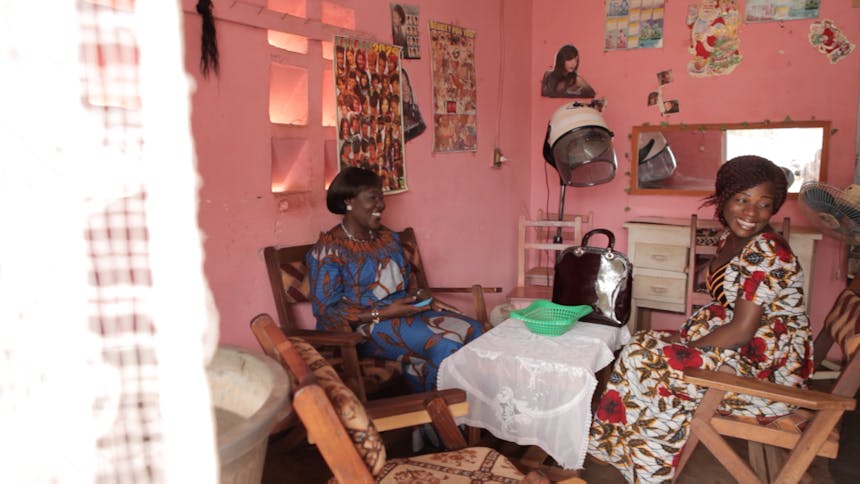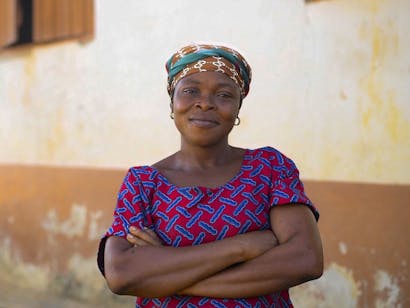Access to finance for women entrepreneurs
In the world’s poorest communities, lack of access to finance is one of many barriers that prevent women from participating as equals with men in society. Lack of credit or even basic savings accounts limit women in their efforts to lift themselves out of poverty through entrepreneurship.

In the morning of February 13th, companies and organizations working on different aspects of financial access (e.g. microcredit, financial technology, development banks and impact investment) were invited at the ImpactCity Hub in The Hague to tackle this issue. To gain new ideas and fresh perspectives on women’s access to finance, CARE Nederland together with ImpactCity organized a pressure cooker design thinking session, involving experts on inclusive finance from SEVI, Oikocredit, FMO, 100WEEKS, Pixplicity and NN Investment Partners.
After an energetic opening by Outside Inc. and a creative introduction of all participants, Solange Hai (Program Manager) presented CARE’s strategy on Village Savings and Loans Associations (VSLAs) and the challenges to connect female entrepreneurs in low-income communities to the financial sector.
CARE supports women to save money through Village Savings and Loans Associations (VSLA). This collective savings method enables members to develop their businesses and empower themselves. VSLAs have been a cornerstone in many CARE programs worldwide and have proven to be a sustainable and trustworthy model for women’s access to finance.

The challenge of VSLA linkages
However, by themselves VSLAs are not a panacea for financial inclusion. They enable people to save and loan, but only up to a limited amount. Therefore, CARE’s strategy is to link VSLAs to Financial Service Providers (FSPs) to formalize their savings and provide access to bigger loans, insurance and other financial products.
Linking VSLAs to FSPs is a win-win situation where low-income communities get access to formal finance, and FSPs expand their client base in areas that are often underserved by financial institutions. But linkage is also challenging: VSLA members are not always sufficiently literate, generally lack formal registration of assets or businesses and are often far away from branch offices. FSPs, on the other hand, need to do more effort to get to know their new clients, adapt or create new products to serve their needs, and often perceive women entrepreneurs as risky clients. That is why start-up costs and operational costs are often relatively high and, because of the context-specific partnerships and products, linkage is not easy to scale up.
Thinking outside the VSLA box
Workshop participants were presented with a specific challenge from a VSLA linkage project in Ivory Coast. As CARE, we acted as ‘problem owners’ and represented two different types of ‘end users’ of the linkage products and services.
- The first was Kofi: a women entrepreneur and VSLA member, with limited (financial) literacy. Kofi’s chicken farm is growing steadily, but she can’t properly document her results and struggles to find a bigger loan to invest in her business.
- The second end user was Richard, a so-called Village Agent: an experienced VSLA member who is hired on request to train VSLA members, create new VSLAs and serve as a community-based connector between the FSP and the community. Richard’s Village Agent work is rewarding but also time consuming, and he struggles to combine it with the farm work that he needs to do to earn a stable income and sustain his family.
Armed with an ample supply of play-doh and post-its, participants joined either the women entrepreneur’s or the Village Agent’s case for a 2,5 hour design thinking pressure cooker session. In this short amount of time, everyone was encouraged to let go of their usual focus and thinking patterns and instead to think out loud, quickly come up with unpolished ideas that could jumpstart inspiration for practical tools to support people like Kofi and Richard. This went from digitally securing land deeds, to mobile financial literacy training, to community-based credit rating mechanisms.

Building on bookkeeping
After going through one cycle of creating, choosing, developing and testing ideas, the session finally resulting in two short pitches. To support Kofi and her peers, the group came up with an accessible bookkeeping tool for entrepreneurs to keep track of their savings, sales, costs and market prices. Initially the tool would be on paper, but once users are familiar with the method and are digitally savvy, it would be transformed to a digital tool. Combined with the regular VSLA records, this would provide a powerful track record to prove credit-worthiness to distant FSPs.
Driving diversification
For the case of the Village Agents, the group proposed a roadmap for diversification to enable Village Agents to offer not only VSLA trainings but also other (financial) services from different providers to VSLA members. On a shared digital platform, different providers can sell their products and services to VSLA members via Village Agents, who can connect to clients with limited digital access and offer personal assistance in the field. This lowers transaction costs for service providers and clients, while increasing the scope of the Village Agent’s work and sales opportunities.
Taking design thinking to practice
A senior management colleague from CARE Ivory Coast was able to attend the pitches via Skype and immediately reacted on the practical application of the pitches. Passionate about the topic and the pitches, he explained that this short design thinking exercise resulted in ideas that indeed resonate well with the needs of Ivorian VSLA members. The scenario of a platform integrating VSLA record keeping, individual bookkeeping and services of Village Agents and other providers sparked particular excitement among the Ivory Coast team and the participants. As the recipe will be refined to see if it can meet the Ivorian taste, this story is definitely to be continued with interested organizations.
Curious to see how this story develops? Interested in financial inclusion in low-income communities? Or do you want to improve access to finance for women entrepreneurs?
Please contact Solange Hai (hai@carenederland.org) or Richard Kooge (kooge@carenederland.org).


